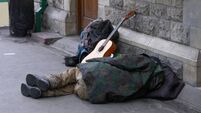Godfrey's Gospel: Education is anything but free in this country

Trinity College, Dublin
THERE was uproar recently when it was announced that the government planned to do away with the €1,000 support it had provided to help students and their parents or guardians towards the €3,000 contribution fee, commonly referred to as the registration fee, for third-level institutions.
This measure, which the government was quick to point out was only a ‘temporary’ one, was introduced to help with the rising cost of living due to inflation and was not intended as a permanent support. That explanation came when tánaiste Simon Harris, obviously taken by surprise by the announcement, expressed his displeasure about its removal, considering that when he was minister for higher education he had pushed for fewer charges and more participation by the public in all kinds of learning initiatives.
I’ll give politicians their due: they are great at finding ways to interpret something, which then gives a whole new meaning to it. In the case of the €1,000 support, it was ‘clarified’ that this was really only the first stage in a process in preparation for the budget and did not mean students, their parents or guardians would be on the hook to pay this money.
This ‘temporary’ measure had to be removed because of its very nature, but government was already working on ways and means to ensure a bridge could be found to negate any added expense.
Brilliant! If nothing else, such an answer just goes to show all the money spent on education in this country wasn’t wasted when those setting the rules can come up with that one.
But for all its faults and failings, the Irish government has done a fantastic job in providing ‘free’ education to the people of this country.
I know the clergy have come in for a bad rap over the past 30 years – and I do not give absolution for any of the dreadful things some of its members were involved in â but when it comes to education, let’s give credit where it is due: at primary level, even if a heavy stick was used at times, everyone did get a basic education.
Anyone my age or older can tell horror stories of teachers dishing out more than was necessary to some children – yes, they were only six, seven- or eight-year-olds – who certainly did not deserve to be treated as they were. Yes, there was favouritism and those whose parents appeared to have more than others did get preferential treatment, but in the round more good than bad was done.
To this day, I pride myself on being a good speller because when in primary school, when it looked as though I couldn’t remember how to spell the simplest of words, one nun took it upon herself to spend extra time with me and a few other dunces and showed us how to break up the words to remember how to spell them. Sounds simple, but in those days no-one did that with you. It was either the rod or nothing at all. Thankfully, I was spared the rod – at least on those occasions.
The annual budget for education in Ireland is around €11 billion, and while educators and parents would like to see that increased, that budget would be mind-blowing to the late minister for education Donogh O’Malley, who introduced free education for second-level students in Ireland in September 1967.
There was a lot of opposition to it at the time – could the country even afford it? – but the man pressed ahead with it and all of a sudden students who previously would have had to be content with finishing their education with the primary exam (an exam taken when you finished primary education) could look forward to, perhaps, sitting their intermediate certificate, as the junior certificate was then called, or be even more audacious and go for the leaving certificate and, maybe, a job in the Civil Service, where before their options were limited to getting a low-paying job locally or the boat to England and a job on the building sites.
Another revolutionary and former Labour education minister, the late Niamh Bhreathnach, who died in February 2023, completed the circle in 1996 when she introduced free third-level education.
Since then, various initiatives such as the SUSI grant, which if a student is on the maximum, is worth €4,292, have been introduced – all helping Ireland, with all its faults and failings, to rank third place in Europe for education and helped attain the highest reading score out of the top 15 countries.
There is no doubt education is anything but free in this country. Parents must make ‘voluntary’ contributions for all sorts of supports for schools. It is now free to sit the dreaded leaving certificate, but schools are often compelled to charge up to €100 to students to sit the mock exams and, as we know, the €3,000 registration fee is only the start of it for students at third level.
I know I’ll probably have the head taken off me for this one, but back in the day â my day – third-level students either went on a J1 to America to earn extra money to offset college expenses for the next academic year or stayed at home and did the same.
Nowadays, while they may work, these same students also believe they are ‘entitled’ to take a holiday at the end of the summer and then have the Bank of Mam and Dad make up the difference when they get home.
Everyone says going to college today is a rite of passage. That may be true, but it should also mean that if you want something, you have to put in the effort – and if that means forgoing a holiday for a few years while pursuing your education, then so be it.




